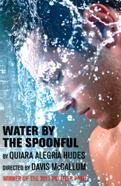Water By the Spoonful Author Quiara Alegria Hudes on Why the Best Theater Is Dangerous
About the author:
“Terror” shouldn’t be in the vocabulary of a writer who won the 2012 Pulitzer Prize for Drama, after having been a Pulitzer finalist twice in the past five years. We’re referring to Quiara Alegria Hudes, whose award-winning play, Water By the Spoonful, is currently in previews at Second Stage. It’s the second in a trilogy centering on one man's struggle to deal with the effects of the Iraq War, following Elliot, A Soldier’s Fugue and preceding The Happiest Song Plays Last, which will debut at Chicago’s Goodman Theatre in April 2013. In a thoughtful essay for Broadway.com, Hudes (also the Tony-nominated librettist of In the Heights) reflects on what it’s like to turn her play over to a director and company of actors and pray that it takes flight for an audience.
![]()
I’m writing this during tech. In five hours is our invited dress. Davis, the tireless director, is diligently going through every cue in the play making each one as clean, precise, and effective as possible. The actors are repeating the entrances to each scene over and over as our production stage manager, Roy, perfects the timing of calling nonstop cues like a juggler with ten pins.
And then there’s me. Doing nothing but observing. A ball of anxiety. This is not the time for rewrites. It’s the time for designers and the director to do their work. I observe. I give notes. I pace in the back unable to channel my nerves into any productive endeavor. The intimacy and camaraderie of the rehearsal hall are a warm memory—the hall is always my favorite period of production. Now everyone’s job is to take that intimacy and make it accessible to the larger world.
I can’t lie: There is terror in this process for me. What starts out as an intimate period of years, as a play that is planted and grows deep in my heart, and develops in the secret corners of my mind, and then takes wing at the table reads, and then takes root in rehearsal—now it is out of my hands, and soon it will belong mostly to the public and least of all to me.
Of course, “terror” is relative, and I am guilty of hyperbole. My husband is a public defender in the Bronx. The stakes for him, on a daily basis, are higher than any theater review I’ll ever receive. Every day he has people’s freedom in his hands. So I remind myself, my terror is a luxury.
Carole Rothman, the founder and artistic director of Second Stage Theatre, finds me pacing up here and does me the favor of striking up small talk. Recently she went to a play that was quite strong and intriguing but never crossed that elusive boundary into gripping her emotionally. It is a slippery, blurry distinction, but I do remember that the plays that have seared my heart and psyche have had one thing in common: a striking moment of danger, when I, in the audience, felt fundamentally unsafe, shocked out of all assumptions.
Carole and I start comparing our favorite instances of this. She says without hesitation, “The angel crashing through the ceiling.” It was frightening, startling, dangerous. (How I wish I had seen that...)
I recall the terror I felt during Jerusalem on Broadway: At one particular moment, a girl comes from the county fair with a goldfish swimming in a clear plastic bag. During the scene, someone takes a pin and pokes a hole in the bottom of the bag. The action continues as a steady stream of water slowly trickles from the goldfish’s lair. The scene continues as the water level gets lower and lower, the goldfish still swimming in circles, unaware.
A question starts to plant itself in my mind: “Are they going to go there? Are they going to make us watch the goldfish drown?” It takes over my thoughts. It’s terrifying and fascinating. I had sushi for dinner—why the hell should I care? And yet, watching this fish die would make me complicit in the extravagance of the storytelling act. A true moment of danger in the theater. It’s exhilarating, infuriating, disturbing. It’s extraordinary theater, a moment when there is no separation between story and reality.
I won’t give away what happens to the goldfish. But I will say that nothing after that moment in the production could top it. Even in the penultimate moments when they beat Johnny “Rooster” Byron to a bloody pulp. That was fake violence. Manufactured storytelling. Makeup. It was less frightening than a goldfish swimming in a bag.
Carole and I share a few more anecdotes, moments of crossover when a theatrical event became a life event.
And then I am back to my playwright’s chair, watching people hard at the work of making a new play. I am grateful for all they give. And I’m silent in the back row, adjusting once again to the role of observer.
